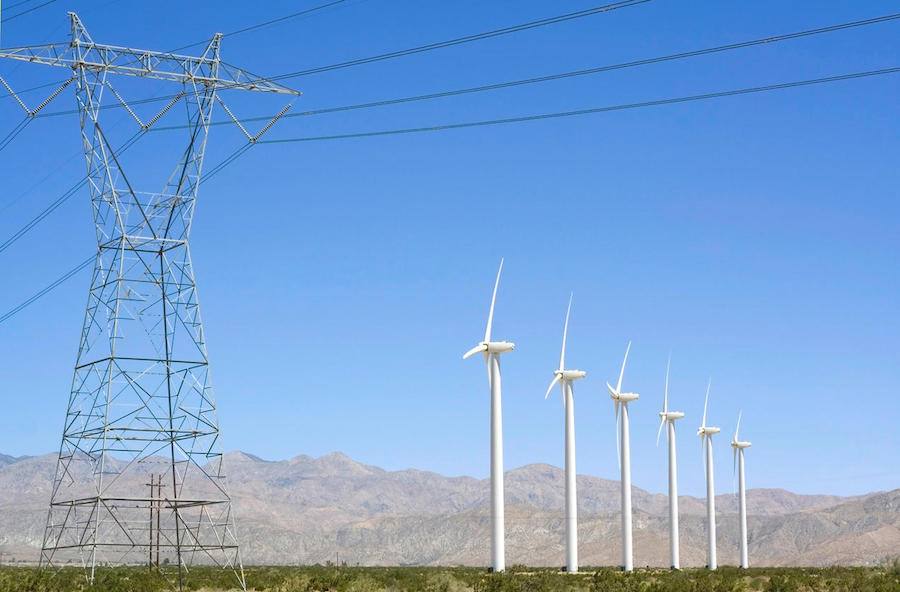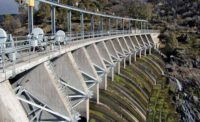Hundreds of gigawatts of new power generation planned in the U.S. are either wind or solar, but inadequate buildout of the nation’s high-voltage transmission system is causing costly delays to their construction and connection to the grid, members of the Federal Energy Regulatory Commission told Congress July 27 at a House Energy and Commerce subcommittee hearing.
FERC’s transmission planning practices have not adjusted to the changing mix in generation and are not forward looking, Commissioner Allison Clements, a Democratic appointee said, adding roughly 93% of 750 GW of power projects now waiting for transmission interconnections are for renewable energy.
Grid upgrades currently are planned piecemeal, but commission Chairman Richard Glick, also a Democratic appointee, told legislators that the agency now is assessing how to make decisions based on a more accurate assessment of the future—including the declining cost of utility scale wind and solar power that he said now are cost competitive with traditional generation.
“At the same time, residential, commercial, and industrial consumers are increasingly demanding that their energy comes from renewable or zero-emissions resources,” Glick said.
FERC in early July unanimously approved an Advance Notice of Proposed Rulemaking seeking public comment on reforms to improve transmission planning and interconnection processes as the U.S. transitions to cleaner energy sources. “The ultimate aim of this initiative is to meet the transmission needs of the future at the lowest cost to consumers,” Glick said, which includes streamlining the process.
In response to Rep. Frank Pallone, (D-NJ) on transmission construction challenges for the state's announced 2,658 MW of offshore wind projects, Glick pointed to the nearly 30,000 MW of wind capacity planned off the East Coast that also will need grid connection. “But we don’t do any long-term planning,” he said, stressing need for a stronger FERC focus on how to bring the developing offshore supply to land-based systems.
Washington state Republican Cathy Rodgers cautioned that FERC must also address reliability risks of clean energy sources that could "take America back to the Dark Ages.” Rep. Gary Palmer, (R-Ala.) asked commissioners if they worry about inflationary effects of moving away from fossil fuels or cost impact on lower income families. “Does it make sense to deprive people of energy justice to promote clean energy?” he said.
Commissioner Neil Chatterjee, a former FERC chairman and Republican appointee who is set to depart the agency shortly, said carbon pricing is the superior approach to the clean energy transition. “My regulatory philosophy is that the Commission should never be a barrier to progress,” he said. While chairman, he and the agency reached a bipartisan agreement that ended a years-long application logjam for liquefied natural gas export terminals and pipelines, approving 14 in 2019 and 2020 that included review of greenhouse gas emissions.
Some committee members worried about FERC review of those emissions when approving oil and natural gas pipelines. Chatterjee said the energy transition could not have been made without the flexibility of natural gas. “It’s scary to think of where we would be without it,” he said.
Courts have said FERC must measure greenhouse gas emissions from pipelines as an impact. When questioned about such impacts, Chairman Glick said he could not say how much is too much for a project. “The question is whether the emissions can be mitigated," he said. "Just because there are significant levels of emissions doesn’t mean we have to reject it.”
FERC also must look at cumulative impacts of greenhouse gas emissions under its federal NEPA law reviews. West Virginia Rep. David McKinley, a Republican trained as a civil engineer, queried Glick bout how downstream emissions such as those from a natural gas power plant will be viewed, The chairman said the agency currently cannot take those emissions into consideration when approving a pipeline.
The interstate pipeline industry is facing profound regulatory uncertainty, which Commissioner James Danley, a Republican appointee, said has resulted in project investment that “has come nearly to a standstill.” FERC must now establish clear policies to examine pipeline applications, he said.
Glick noted growing pressure from court rulings for the agency to make such determinations.
FERC also is taking steps to better respond to environmental justice impacts in project reviews, recently expanding its public outreach during project deliberations.
“It is unlikely that FERC is hearing from members of historically marginalized communities with the same force and frequency as other stakeholders and thus it is essential that environmental justice and equity get the attention in our decision-making processes that they deserve,” Glick said.






Post a comment to this article
Report Abusive Comment